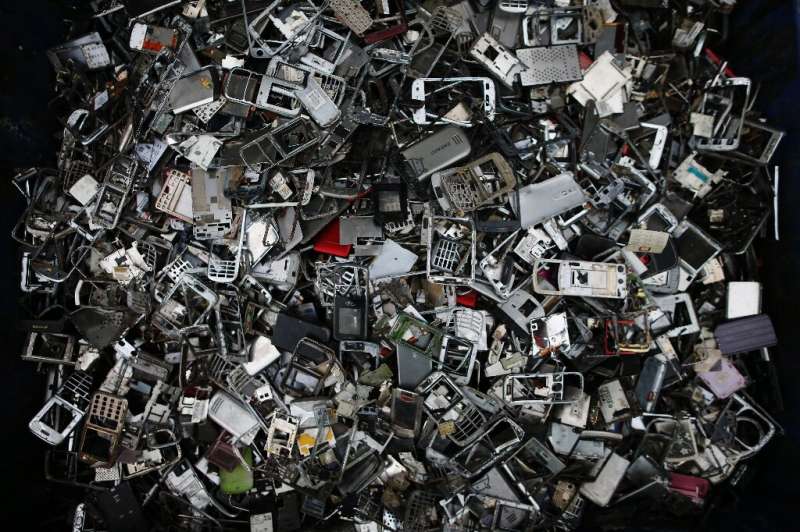#E-waste recycling matter of national security: report

“#E-waste recycling matter of national security: report”

Recovering precious elements from e-waste is a security imperative for Europe that should be written into law, according to a report Monday that said it was “crucial” to ensure industry competitiveness and sustain tech-dependent lifestyles in the region.
Circuit boards, magnets in disk drives and electric vehicles, batteries and fluorescent lamps are among items containing critical raw materials—including gold, silver and cobalt—that could be recycled and reused, the research found.
This would safeguard supplies for consumer electronics and even the defence industry, said the consortium behind the European Union funded CEWASTE report, which said the fate of these materials was a “societal challenge”.
Despite these essential materials being vulnerable to geo-political upheavals, it said, Europe remains too reliant on foreign supply, with recycling rates “close to zero”.
“We’ve been recycling for centuries, it’s one of the oldest professions,” said Pascal Leroy, from the WEEE Forum, one of the authors of the report.
“What makes this era different from previous eras is that we need the critical raw materials to make products that sustain our high tech lifestyle,” he said.
Supply chain ‘vulnerable’
With these elements needed for wind turbines and electric cars, they also play a crucial role in meeting climate goals and manufacturing competitiveness.
But Leroy said Europe’s supply chain had become “too vulnerable”.
He told AFP the defence industry was particularly exposed, with everything from computer systems to drones reliant on external supplies such as rare earth elements, which almost exclusively come from China.
The report highlighted several categories of e-waste it said have high enough quantities of these raw materials to warrant being recovered.
These include materials in printed circuit boards from discarded electrical equipment; batteries from e-waste and scrap vehicles; neodymium iron boron magnets from hard disc drives and engines of e-bikes, scooters and scrap vehicles; and fluorescent powders from lamps and cathode ray tubes—found in TVs and monitors.
It found that low and volatile prices for many of these raw materials means that recycling is often considered too costly for businesses.
The report called for legal requirements to recycle and reuse critical raw materials, financial incentives to support industry and better controls on shipments of e-waste out of the EU.
“No one will do this voluntarily, because it costs money,” said Leroy.
Lost for tomorrow
According to the United Nations, more than 50 million tonnes of electronic waste was discarded in 2019, with the vast majority ending up in landfill and on scrap heaps.
With only 17 percent of products recycled, the UN estimates that materials worth more than $55 billion (50 billion euros) are being wasted every year.
Meanwhile, more must be mined to make new products, sparking environmental and human rights fears.
Federico Magalini of sustainability consulting firm Sofies, another author of the CEWASTE report, said that these materials are often present in such tiny quantities in each individual item that they are overlooked.
For example, the report estimated that in 2025, discarded fluorescent lamps in Europe will contain 92 tonnes of critical raw materials.
Printed circuit boards in the region’s e-waste could contain as much as 41 tonnes of silver and 10 tonnes of gold in 2025, it said.
These quantities would be roughly the same as the amount used to make new items, said Magalini.
And even when electronic products are recycled, some of these elements are not recovered, he added.
“What we lose today is lost even for tomorrow.”
© 2021 AFP
Citation:
E-waste recycling matter of national security: report (2021, May 10)
retrieved 10 May 2021
from https://phys.org/news/2021-05-e-waste-recycling-national.html
This document is subject to copyright. Apart from any fair dealing for the purpose of private study or research, no
part may be reproduced without the written permission. The content is provided for information purposes only.
If you liked the article, do not forget to share it with your friends. Follow us on Google News too, click on the star and choose us from your favorites.
For forums sites go to Forum.BuradaBiliyorum.Com
If you want to read more Like this articles, you can visit our Science category.




